|
The Gold Rush
Indiaís overall medal haul of 64, including 14 gold, was their best-ever in the Asian Games, thanks to some sterling performances from unexpected quarters,
writes M. S. Unnikrishnan
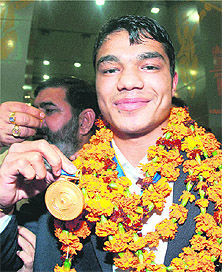
Eighteen-year-old Vikas Krishan from Bhiwani won the gold in the 60-kg weight category.
|
Indian
sportspersons reached out to conquer new frontiers in the 16th
Asian Games at Guangzhou (China), which was a refreshing
deviation from the beaten track. India struck medals in events
in which they were not expected to triumph, while those on whom
hopes were pinned, failed to deliver. Indian sportspersons won
medals virtually in all disciplines they competed, barring a few
exceptions, and track and field threw up a few surprise gold
medal winners.
Somdev Devvarman
and Ashwini Chidananda Akkunj stood out with their golden
doubles, and the domination of women in track and field events,
gave a pleasing turn to Indiaís overall medal haul of 64 ó
14 gold, 17 silver and 33 bronze ó to finish sixth on the
table. This was Indiaís best-ever gold haul in the Asian
Games, which was one short of the 15, they won in the inaugural
Asiad in Delhi (1951) and one more than the 13 they collected in
the 1982 Delhi Asiad. Five gold medals in athletics, two
each in tennis, boxing, kabaddi and one each in shooting, cue
sports and rowing boosted Indiaís overall placement, though
the inability of the shooters to rise above the ordinary in the
face of tough competition, prevented us from hitting the
century-medal mark (101) achieved in the Ninth Commonwealth
Games in Delhi a month earlier.
The hockey teams
flattered to deceive though the men bagged the bronze as a poor
consolation, after finishing outside the medal bracket in the
2006 Doha Asiad, while the women drew a blank. Krishna Poonia,
womenís discus throw gold medallist in the Commonwealth Games,
had to settle for a bronze while Rajit Maheshwari, who had
cleared 17.7 metres in Delhi for a medal in menís triple jump,
could finish only fourth as he could not hit the peak form he
had displayed a month earlier.
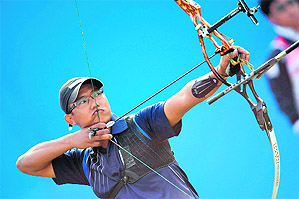
Tarundeep Rai, a cousin of football ace Baichung Bhutia, won the silver in the menís singlesí archery
|
Saina Nehwal
proved a flop artist in badminton as she simply could not match
the firepower of the Chinese girls, despite expectations back
home, while Sania Mirza, too, could not rise to the level
expected of her, to fulfil her gold dream in tennis. Medals in
roller-skating, swimming, gymnastics and archery were the icing
on the cake. The silver won by Tarundeep Rai, a cousin of
football ace Baichung Bhutia, in menís singles archery, was
quite gratifying as he had to battle it out with the tough
Koreans. A silver for Tarun and bronze in the menís and womenís
team events put the archers too up above, as it was a remarkable
progress from the lone menís team bronze they had won at Doha
four years ago.
Twentyfive-year-old
Somdev Devvarman yet again proved that he was a different kettle
of fish when it comes to playing for the country as he not only
won the singles and doubles gold (in the company of Sanam
Singh), but also helped the team win a bronze. He thus proved
that his triumph in the singles event of the Commonwealth Games
in Delhi was no flash in the pan. Somdev, ranked 106, battered
top seed and 40th-ranked Denis Istomin in two
straight sets, conceding a measly three points overall, to win
the gold.
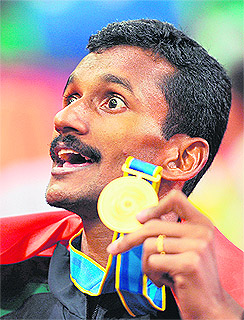
Joseph Abraham produced a menís track gold in the 400m hurdles after over three decades
|
This was a sweet
revenge for Somdev, as he had lost to the Uzbek in his Davis Cup
debut. The singles and doubles gold made Somdev the first player
in 24 years to trap a "golden double" in Asian Games
tennis after Yoo Jin Sun of Korea, who achieved it previously in
1986 at Seoul.
Joseph Abraham
produced a menís track gold after over three decades when he
glided over the 400m hurdles to hit pay dirt. Chand Ram (20km
walk) and Charles Borromeo (800m) in the 82 Asiad were the last
to bring track golds for the country. Josephís feat was
remarkable as Indian male athletes rarely stand a chance in the
hurdles event. Yet, the medals won by the 69-strong athletics
squad were comparatively less, and they have to strive a lot
more hard to beat the record of 16 medals, including seven golds,
won from track and field, in the 2002 Busan Asiad.
The men kept their
date with the kabaddi gold for the sixth time on trot ó in the
1990 Asiad in China the lone gold for India came from kabaddi
ó while the women, too, made their kabaddi debut memorable by
lifting the gold, after warding off a torrid fight from Iran in
the semis. The men, on the other hand, laid low Iran both in the
league round and in the final, to reassert their prowess in this
body-contact sport.
Seven medals in
boxing, including two golds, were a surprise addition, to finish
second behind China in the event.
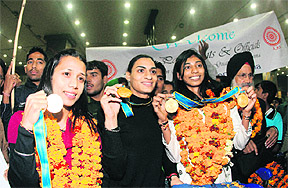
Mandeep Kaur (left), Manjit Kaur (centre) and A C Ashwini, along with Sini Jose (not in picture), won the gold in 4x400m relay. Ashwini also got the gold in 400m womenís hurdles.
|
And Vijender Singh
(75kg), the World No. 1, who came good to erase the shocking
memory of his semi-final exit from the Commonwealth Games, and
the remarkable poise and fighting spirit displayed by the
18-year-old Vikas Krishan ó both from the Bhiwani boxing
stable ó elevated Indian boxing to a different level. Though
India put five boxers in the final, only two could pluck golds
was cause for some disappoint, but the triumph of the
chess-playing Vikas, to emerge as the youngest gold medallist in
the Asian Games, gave a lot to cheer about, as his gold came
after a 12-year hiatus. Dingo Singh (56kg) had won the last
boxing gold for India in the 1998 Bangkok Asiad, and the display
in China hold out a lot of hope for the Indian pugilists in
major competitions ahead. Both Vijender and Vikas thus joined
the august company of Padam Bahadur Mal, Hari Singhl, Hawa
Singh, Kaur Singh and Dingo, who had brought golds from the
ring.
Somdev Devvarman
(tennis), Bajran Lal (rowing), Ronjon Sondhi (double trap
shooting), Vikas Krishan and Vijender Singh (boxing), Pankaj
Advani (cue sports), Preeja Sreedharan (10,000m gold and 5000m
silver), Sudha Singh (steeple chase), Ashwini Akkunj (400m womenís
hurdles and 4x400m relay) and Joseph Abraham (400m menís
hurdles) were the individual gold winners.
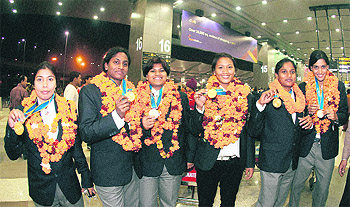
The Indian women kabaddi players made their debut memorable by lifting the gold
|
India had never
before won a gold in distance running, but Preeja Sridharan
rewrote the script with a remarkable golden streak in the
10,000, at the Aoti Sports Complex. India made a one-two in the
event when Kavita Raut, too, sprinted past Shitaye Eshete to bag
the silver in 5000m. Shitaye, a former Ethiopean champion, who
turned out for Bahrain, was an overwhelming favourite to win the
race, but Preeja and Kavita toppled the formbook to bring the
first gold and silver from the track for India. And then Sudha
Singh warded off a late charge from Chinaís Jin Yuan to ensure
the steeple chase gold, which was again a first its kind.
Though a gold was
expected from Tintu Luka in the 800m, she made the same tactical
mistake as she did in the Commonwealth Games, to be pushed to
the bronze slot. But it was some achievement, as the 18-year-old
has time on her side and she has a great mentor in P. T. Usha,
whose four gold and one silver in 1986 Asian Games, still stands
as a landmark achievement in the annals of Indian sports. Tintuís
bronze was not only a great morale-booster for the athlete, but
it was also the first international medal for the Usha School
Athletics, located on a 30-acre expanse in her village Koilandi
(Kerala).
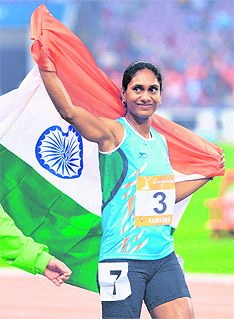
Pramila Gudandda celebrates after she won the bronze medal in womenís heptathlon Photos: AFP, PTI
|
And the exploits
of Ashwini will be written in golden letters as well not only
for her golden run to sail past all hurdles in the 400m, but
also her gravity-defying race in the 4x400m relay, running in
the third lap, to prise open the kind of lead, which helped the
Indian quartet (Mandeep Kaur, Sini Jose, Ashwini and Manjit
Kaur) hit the gold, in a repeat performance of their magnificent
run in the CWG in Delhi
True, Indiaís
medal count was nothing compared to the surge made by hosts
China, who had entered the Asian Games fold, after coming out of
their self-imposed exile from the iron curtain, only at the 1974
Teheran Games. The efforts made by the Indian government in
providing sustained training facilities, including foreign
exposure, under the watchful eyes of foreign experts, are paying
dividends for the country.
The medals from
track and field are fine examples of institutional support, and
almost all medal winners are gainfully employed with the
Railways, public sector institutions and the state governments
to make their life comfortable, leaving them with peace of mind
to concentrate on their sports career. The attractive incentives
being provided by the Central Government, state governments and
a various public sector institutions, act as a great motivator
for these sportspersons to strive for their best, as most of
them, particularly the athletes, hail from`A0modest to poor
background. Imagine, Tintu Lukaís parents had to go to the
neighbourís house to watch their daughterís race on
television as they cannot afford to have one at home!
Pankaj Advani had
set the ball rolling, literally, when he won the billiards gold
to defend his crown while Bajraj Lal Thakar, twice Asian
champion and silver medallist at Doha, upgraded his single skull
rowing event to gold. World champion and world record holder
Ronjon Sondhi was the only golden boy in shooting as Gagan
Narang, Abinav Bindra et al failed to hit the bullís eye.

|